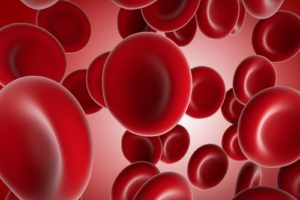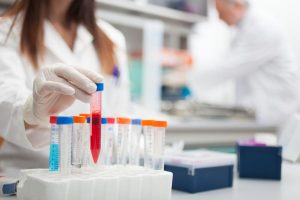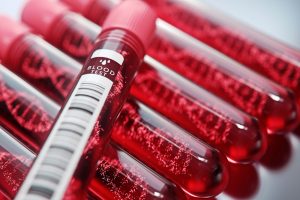Pernicious Anemia Samples
Bay Biosciences provides high quality, clinical grade bio-samples, cryogenically preserved bone marrow aspiration, bone narrow biopsy tissue, FFPE blocks, sera (serum), plasma and peripheral blood mononuclear cells (PBMC) biofluid specimens from patients diagnosed with Pernicious Anemia disease.
The PBMC, sera (serum) and plasma biofluid samples are processed from patient’s peripheral whole-blood using customized collection and processing protocols. The human Pernicious Anemia bio-specimens are collected from unique patients suffering from Pernicious Anemia disorder and are provided to a valued pharmaceutical customer for research, development and drug discovery.
Pernicious Anemia Overview
Pernicious anemia is a rare autoimmune blood disorder characterized by the inability of the body to properly utilize vitamin B12, which is essential for the development of red blood cells and to keep the nervous system working properly. Pernicious anemia is caused by the immune system destroying stomach cells. Most cases result from the lack of the gastric protein known as intrinsic factor, without which vitamin B12 cannot be absorbed. Vitamin B12 helps the body make healthy red blood cells and helps keep nerve cells healthy. It is found in animal foods, including meat, fish, eggs, milk, and other dairy products. The most common cause of pernicious anemia is the loss of stomach cells that make intrinsic factor. Intrinsic factor helps the body absorb vitamin B12 in the intestine. The loss of parietal cells may be due to destruction by the body’s own immune system. Pernicious anemia can cause permanent damage to nerves and other organs if it goes on for a long time without being treated. It also raises the risk for developing stomach cancer.

Signs & Symptoms of Pernicious Anemia
Pernicious Anemia causes a variety of symptoms and signs, for for example:
- Fatigue
- Shortness of breath
- Rapid heart rate (arrhythmias)
- Weakness
- Jaundice or pallor
- Numbness and tingling of hands and feet
- Loss of appetite
- Diarrhea
- Unsteadiness while walking
- Bleeding gums
- Impaired sense of smell
- Confusion
- Personality changes
Because nerve cells need vitamin B12 to function properly, some patients with Pernicious Anemia will show neurological symptoms. Nerves other than those of the brain and spinal cord (peripheral nervous system) are frequently affected. Occasionally, the spinal cord may also be involved.
Neurological symptoms may include numbness, tingling, loss of sensation in the arms and/or legs (acroparesthesias). Other neurological symptoms may include impaired ability to coordinate movement (ataxia), a positive Babinski sign (outward motion of the big toe caused by stroking the sole of the foot), and/or exaggerated reflexes (hyperreflexia). Some patients with Pernicious Anemia may also become extremely irritable or depressed and, in some rare cases, even experience paranoia (megaloblastic madness).
Causes of Pernicious Anemia
Pernicious Anemia is caused by a lack of intrinsic factor (which is a protein made in the stomach, it is needed to absorb vitamin B-12) or other causes, such as infections, surgery, medicines, or diet. Pernicious Anemia is thought to be an autoimmune disease. Autoimmune disorders are caused when the body’s natural defenses (e.g., antibodies) against “foreign” or invading organisms begin to attack healthy tissue for unknown reasons. Pernicious Anemia is sometimes seen in association with certain autoimmune endocrine diseases, such as type-1 diabetes, hypoparathyroidism, Addison’s disease, and Graves’ disease.
Since the disorder also tends to occur with greater frequency in certain families than in others, it is also believed that there may be a genetic component to pernicious anemia. In general, risk factors for pernicious anemia include a family history of the disease, being of Northern European or Scandinavian descent, and a history of autoimmune endocrine disorders.
The gene responsible for anemia due to intrinsic factor deficiency has been tracked to a location on chromosome 11 (11q13). The gene responsible for anemia due to the intestinal malabsorption of vitamin B12 has been tracked to sites on chromosome 14 (14q32) and 10 (10p12.1).
Genetic diseases are determined by the combination of genes for a particular trait that are on the chromosomes received from the father and the mother. Recessive genetic disorders occur when an individual inherits the same abnormal gene for the same trait from each parent. If an individual receives one normal gene and one gene for the disease, the person will be a carrier for the disease, but usually will not show symptoms. The risk for two carrier parents to both pass the defective gene and, therefore, have an affected child is 25% with each pregnancy. The risk to have a child who is a carrier like the parents is 50% with each pregnancy. The chance for a child to receive normal genes from both parents and be genetically normal for that particular trait is 25%. The risk is the same for males and females. All individuals carry a few abnormal genes. Parents who are close relatives (consanguineous) have a higher chance than unrelated parents to both carry the same abnormal gene, which increases the risk to have children with a recessive genetic disorder.
Lack of Intrinsic Factor
Intrinsic factor is a protein made in the stomach. It is needed to absorb vitamin B-12. In some people, an autoimmune response causes a lack of intrinsic factor. An autoimmune response occurs if the body’s immune system makes antibodies (proteins) that mistakenly attack and damage the body’s tissues or cells.
In pernicious anemia, the body makes antibodies that attack and destroy the parietal cells. These cells line the stomach and make intrinsic factor. The cause of this autoimmune response happening is unknown. As a result of this attack, the stomach stops making intrinsic factor. Without intrinsic factor, the body can’t move vitamin B12 through the small intestine, where it’s absorbed. This leads to vitamin B12 deficiency. A lack of intrinsic factor also can occur if a part or all of the stomach is surgically removed. This type of surgery reduces the number of parietal cells available to make intrinsic factor. Rarely, children are born with an inherited disorder that prevents their bodies from making intrinsic factor. This disorder is called congenital pernicious anemia.

Detailed clinical data, elevated levels of antibodies, serology, biomarkers, CBC, B-12 levels, autoantibodies test, folate levels, genetic information, pathology annotations associated with the Pernicious Anemia patient’s specimens is provided to a valued customer for drug discover, development and research. The Pernicious Anemia disorder PBMC, sera (serum) and plasma biofluid samples are processed from patients peripheral whole-blood using customized collection and processing protocols provided by the researcher.
Bay Biosciences is a global leader in providing researchers with high quality, clinical grade, fully characterized human tissue samples, bio-specimens and human bio-fluid collections from cancer (tumor) tissue, cancer sera (serum), cancer plasma, cancer PBMC and human tissue samples from most other therapeutic areas and diseases.
Bay Biosciences maintains and manages it’s own bio-repository, human tissue bank (biobank) consisting of thousands of diseased samples (specimens) and from normal healthy donors available in all formats and types. Our biobank procures and stores fully consented, deidentified and institutional review boards (IRB) approved human tissue samples and matched controls.
All our human human tissue collections, human specimens and human bio-fluids are provided with detailed samples associated patient’s clinical data. This critical patient’s clinical data includes information relating to their past and current disease, treatment history, lifestyle choices, biomarkers and genetic information. Patient’s data is extremely valuable for researchers and is used to help identify new effective treatments (drug discovery & development) in oncology, other therapeutic areas and diseases. This clinical information is critical to demonstrate their impact, monitor the safety of medicines, testing & diagnostics, and generate new knowledge about the causes of disease and illness.
Bay Biosciences banks wide variety of human tissue samples and biological samples including cryogenically preserved -80°C, fresh, fresh frozen tissue samples, tumor tissue samples, FFPE’s, tissue slides, with matching human bio-fluids, whole blood and blood derived products such as serum, plasma and PBMC’s.
Bay Biosciences is a global leader in collecting and providing human tissue samples according to the researchers specified requirements and customized, tailor made collection protocols. Please contact us anytime to discuss your special research projects and customized human tissue sample requirements.
Bay Biosciences provides human tissue samples (human specimens) from diseased and normal healthy donors; including peripheral whole-blood, amniotic fluid, bronchoalveolar lavage fluid (BAL), sputum, pleural effusion, cerebrospinal fluid (CSF), serum (sera), plasma, peripheral blood mononuclear cells (PBMC’s), saliva, Buffy coat, urine, stool samples, aqueous humor, vitreous humor, kidney stones, renal calculi, nephrolithiasis, urolithiasis and other bodily fluids from most diseases including cancer. We can also procure most human bio-specimens and can do special collections and requests of human samples that are difficult to find. All our human tissue samples are procured through IRB approved clinical protocols and procedures.
In addition to the standard processing protocols Bay Biosciences can also provide human plasma, serum, PBMC bio-fluid samples using custom processing protocols, you can buy donor specific sample collections in higher volumes and specified sample aliquoting from us. Bay Biosciences also provides human samples from normal healthy donors, volunteers, for controls and clinical research, contact us Now.
日本のお客様は、ベイバイオサイエンスジャパンBay Biosciences Japan またはhttp://baybiosciences-jp.com/contact/までご連絡ください。



